- Small Dog Place Home
- Introduction to Small Dogs
Small Dogs: An Introduction
Small Dogs, By Janice Jones |Last Updated 04-10-2024
It's hard to resist the cuteness of small dogs, especially when they are puppies. All of them remain small throughout their lives, so many think of them and treat them like children.
Even if you are not guilty of confusing your dogs for your human children, all little dogs deserve to be part of the family.
Why do People Love Small Dogs?

You either love little dogs or you don’t. If you don’t, you can find or imagine plenty of reasons to dislike them some fall within the realm of urban myths and others have a ring of true to them.
But if you love these tiny dogs, anything but a tiny, toy, or small dog just won't do.
Other than their size, there is a great variation within the breeds on this site. Some are toys, terriers, hounds, and even herding dogs. But they all have one thing in common: They are all small and manageable.
Why do so many people love little dogs? We started asking and here are the top ten reasons people gave for loving their mini dog, whether it was a purebred, hybrid, or a well shall we say mutt?
#1 Little Dogs are, Well Little
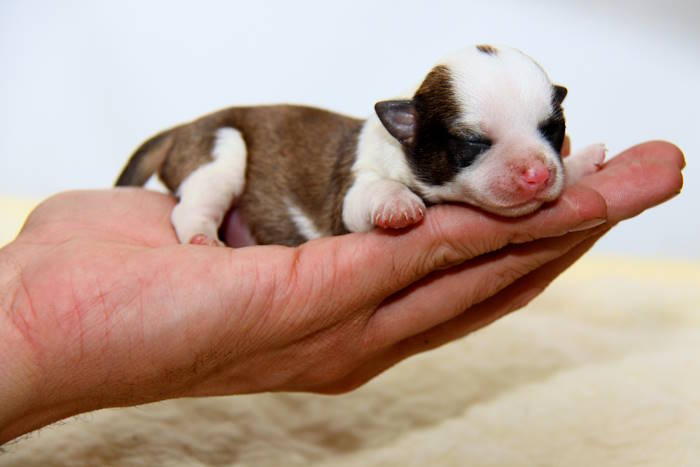
Their small size makes them portable, easy to travel with and easy to transport to the vet, the groomers, or the doggie day care center.
For people downsizing or just preferring to live with less, a small dog is perfect. You can pick them up, carry them in a purse or carrier or just take a leisurely walk knowing that you won't have 60 pounds of weight pulling you along.
#2 Does Cuteness Count?
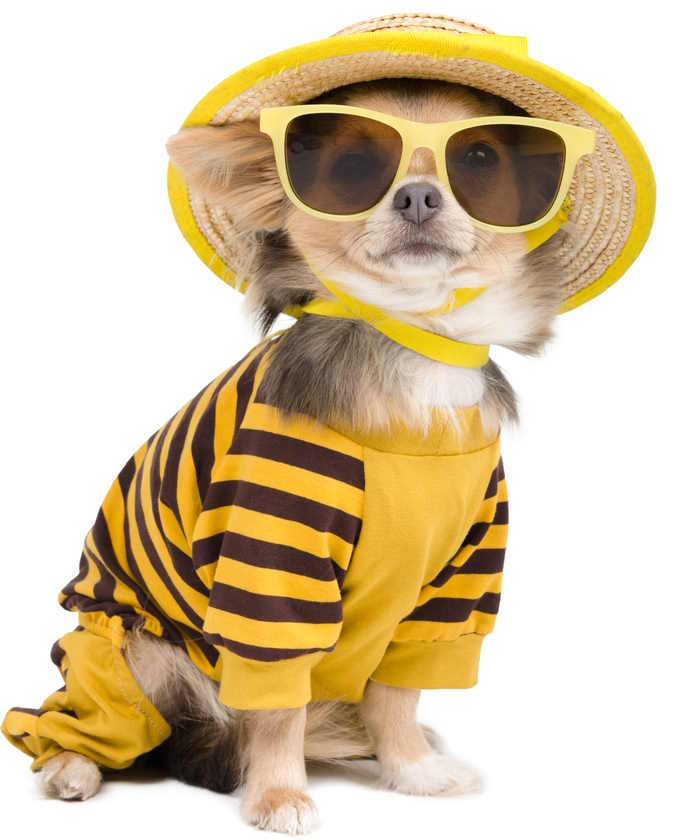
Who can resist that face? They are so darn cute. When you see a dog for the first time, what is the first thing you notice? Chances are it's not the tail or the paw unless those body parts stand out as being unusual.
It's the head, the eyes, the ears and certainly the tongue if the dog likes giving kisses.
#3 Cleanup is a Breeze
People who love small dogs don't enjoy the size of a Great Dane Poop pile. Let's face it, clean up is going to be much easier with small dogs and disposing of their wastes will not cause undue stress for the local sewer district or trash disposal service.
If you have a garden or yard, where they can defecate, their poop just seems to dissolve into the grass, sometimes making it rather hard to clean up after them.
#4 The Well-Dressed Small Dog
Doggie clothes, doggie jewelry, hair bows, and doggie accessories—so many ways to spend your money. Who can resist the temptation to join the canine couture?
Many people who purchase small dogs dream of dressing them up for all occasions. From cool summer dresses, to bunny ears at Easter to clever Halloween Costumes, dressing up a small dog is just plain easier than wrestling a 60 pound dog into a Santa Suit.
#5 The Ultimate Foot/Lap Warmer
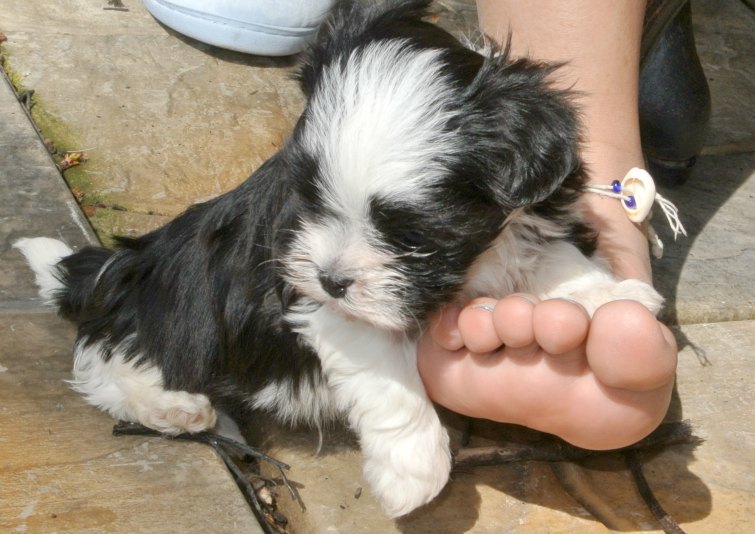
There couldn't be a better way to warm your lap or cold toes than a 6 pound dog who loves to cuddle. Yes, large dogs can do this too, but who wants a 75 pound dog sitting on your lap.
Who needs heavy blankets when you share your bed with the ultimate foot warmer? Might I add that such a cozy warm body on a cold winter night might actually help you save on your heating bill?
#6 Little Dogs Mean Less Expense
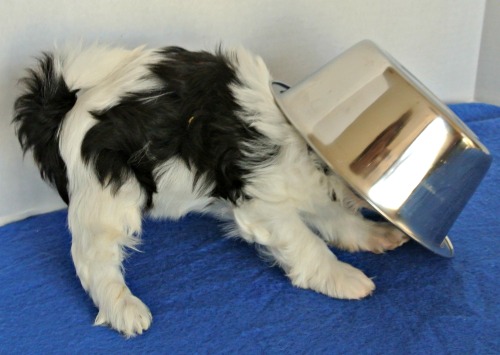
Your grocery bill will be small; one small bag of kibble lasts for weeks to months. Just a quick food calculation might make you think twice about getting a large breed dog.
If you plan to purchase kibble for your dog, estimate about 4 cups in every pound. A 30-pound bag will yield you 120 cups. Now, if you are serving about 3/4 cup per day, that six pound bag will feed your dog for 160 days. That's almost 6 months worth of food.
If that bag of food costs you $45.00, that's only $0.28 per day!
Compare that with a 100 pound dog, that same bag will last you a month at a cost of 1.50. This is an example of a moderately priced dog food. If you go with a premium, it is going to be much more.
#7 Many Small Breed Dogs Know How to Be Companions - They've been doing it for 1000s of years.
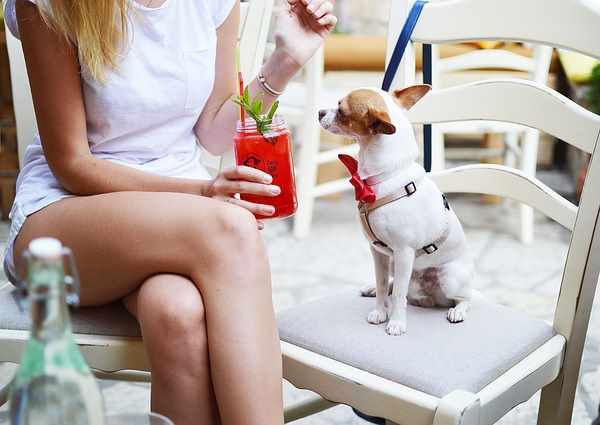 Many Small Breed Dogs Know How to Be Companions - They've been doing it for 1000s of years.
Many Small Breed Dogs Know How to Be Companions - They've been doing it for 1000s of years.Many pint sized dogs have been bred for thousands of years for one purpose, and one purpose only, to be your companion and your friend.
They won’t mind how boring you are or how dull your life might seem. They are content to sit on your lap or lie by your feet and watch the world go by. That is their sole purpose in life and they love what they do.
#8 Many Don't Require Much Exercise
You don’t need to be a bodybuilder, great athlete, or marathon runner to pick them up and exercise them. They are lightweight, easy to manage, and many don't require much exercise.
Exercise needs vary with breeds, so before you choose your small breed dog, determine how much time you will need to devote to exercise.
#9 Good Choice for First Time Owner
Due to their size, most small breed dogs are fine for first time dog owners. While we can't generalize across all breeds, even strong willed small dogs are easier to handle than their larger cousins.
For novices who have never trained or managed a dog before, a small dog may allow you to gain confidence in your abilities as you learn all the ins and outs of training canines.
#10 Small Dogs are Smarter Than You Think
Large working dogs tend to get the most credit for being smart, but there's more than one type of smart. Dr. Jan Pol, the reality-show vet that stars in The Incredible Dr. Pol on Nat Geo Wild, told AARP reporter, Susan King,
"The Longer I work with Animals, the Smarter They Get."
Most small dog owners will report at least one, but most report many instances of their dog's uncanny intelligence. From identifying different types of toys to knowing the second you pull into your driveway, dogs surprise us all the time.
Do small dogs read minds? When they stare into your eyes, it seems like they see straight through to your soul. What better friend could you ask for?
Now, I've told you why people love small dogs, now, it's your turn...
Why do you Want a Small Dog?
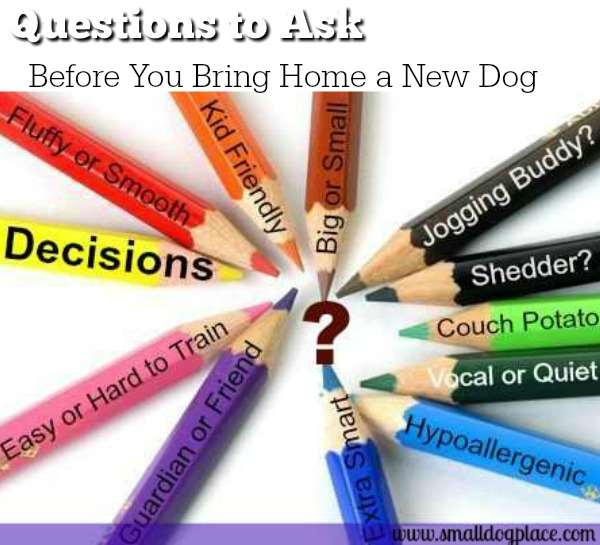
Getting a small dog may be on the top of your to-do list, but have you stopped to ask yourself, Why do I want a small dog?
- They're so Cute or fluffy
- Love the color of the hair
- Celebrities have them, why can’t I?
- The Neighbor has one and he’s so charming, I want one too.
- Companionship—I want a dog that will follow me everywhere.
- Love, chance to nurture—my children are grown.
- For protection—it is not safe as it used to be here.
- For my children—I want to teach my child responsibility.
- Want to meet people—it is much easier to meet that special someone if I have a cute dog on the other end of the leash.
Getting a Small Dog requires a little planning and sometimes some soul searching. A dog is almost like a kid these days so planning is essential. Both heart and head need to go into the decision process.
Before you hit the road to look for your new canine baby, take the time to evaluate your own life situation, your lifestyle, what you can and cannot manage, your finances, your health.
Your Finances
Unless you are super wealthy, you will want to consider your budget and how much money you have to either adoption or purchasing and then what you will need for all the supplies that a new dog will need. Beyond supplies, you will need to budget vet visits, grooming appointments, dog walkers if needed and possibly daycare. Dog sitters or boarding costs can also add up if you travel frequently.
Take a look at what it costs to own a dog and then do some personal financial planning.
You and Your Family's Health
You will want to evaluate your health and that of all members of your household. Many people suffer from allergies, and if you are one of them, your selection of dog breeds from which to choose must be taken into consideration. You don't want to bring home that adorable puppy, only to find out you are severely allergic to him. Luckily there are some hypoallergenic breeds that might be perfect for you.
Don't underestimate the needs of an energetic puppy especially if you are approaching your retirement years.
Legalities and Such
Are you allowed to have a dog where you live? If you live in a rental unit, there are usually some restrictions to pet ownership.
If you live in a community with some type of zoning or restrictions, there may be a limit to the size and number of dogs you can own.
It is always best to be safe than sorry because a puppy is not like a piece of clothing that can be returned for a full refund.
Your Current and Future Plans
Do a life style reality check to be sure a dog would fit in well. Dogs are social creatures and need companionship. Dogs that must remain alone for extended periods of time are not happy and will display their anguish in many undesirable ways.
They require care, training, exercise, and nurturing. Do you have the time? Are you willing to make some changes to accommodate a new furry friend?
Are you away from the home 10 hours a day? Do you travel for your job? Do you enjoy vacations away from home, free of any hassles? Is your work schedule erratic where you might not be home at predicable times each night?
Do you have children? Consider their ages and activities. Will you be able to manage a puppy and small children at the same time? How old are your children. Do they have the maturity to respect the needs of a puppy or adult dog? Remember many small breed dog breeders will not sell to families with toddlers or preschoolers as they consider it a risky proposition.
Don't rush though this planning stage. Once you've determined you are ready, the next step is to make a few more decisions.
Do you want a puppy or adult?
Do you want a boy or girl?
Do you know what breed you'd like to have?
These are just some of the questions you will want to explore because the answers to these questions will help you find the right pooch for you.
Do You Think You'd Prefer a Boy or Girl?
Are there any real differences?
Boy or Girl? Many chose a gender based on a childhood pet. There are differences, but they are slight.
If this is one of those decision you are contemplating, be sure to choose the Best Gender.
Where to Get that New Dog?
Not sure whether to call a breeder, contact a rescue organization, or visit a local shelter?
You are not alone.
There are so many options, so knowing ahead of time which one is likely to feel best to you is important.
Most people don't have extra hours to waste these days, so plan your time wisely.
Why waste time visiting tons of breeders when a quick trip to a human society fits you better.
Likewise, you don't want to visit the local shelter weekly for years looking for the perfect pet, when the right breeder is right down the street.
Your Adoption Options
Let's Start with Adoptions. Does the thought of adopting a new puppy, adult dog or senior from a rescue group or shelter appeal to you. If so, you're not alone.
Many people would prefer to save a life rather than buy from a breeder. But there are some important questions you need to ask yourself. Is a dog adoption the right choice for you?
Many people do not have the luxury of walking into their local dog shelter and picking out a dog to take home. It takes weeks, if not months to find the right dog and connect to the appropriate rescue group. Hopefully, we've made it easier for you by offering some adoption tips for pet owners. If you are worried about adoption costs, you can relax, as adoption will never cost you as much as purchasing from a pet store.. If you choose to adopt a senior dog, your fees will be lower. Before ruling out adoptions and moving towards working with a dog breeder, it's worth taking a look at what it is like for a dog living in a dog shelter.
Purchase a Puppy from a Breeder
Or, do you have your heart set on a new puppy from a specific breed. There is nothing wrong with that. Many people prefer to start with a puppy, and puppies are not always easy to find in shelters. But, all breeders are not alike.
You will want to choose a breeder that is both knowledgeable and experienced, but also with a high morale character and excellent ethics. There are at least four types of dog breeders, some of which are better than others. The last thing you want to do is become a victim of a puppy scam!
While we're on the subject of breeder, you will want to prepare a list of questions to ask breeders and make sure you get the answers you're seeking. Also, be prepared to answer some questions as reputable breeders will want to know where their puppies will live and how they will be cared for.
Now it's Time to Choose the Breed...
We hope to make the job of choosing the best small dog as easy as possible.
All the breeds on this site are considered small dogs, meaning that they are 25 pounds or smaller as adults, assuming of course, that they are not obese.
All small breed dogs have a few things in common:
- Their size makes it easy to keep them in smaller places.
- They all consume less food so they are more economical in this regard.
- They are more portable – easier to carry travel and take places.
- Their size makes them easier to manage and so they are good for first-time, inexperienced dog owners.
- Most do not require a ton of exercise.
This entire website is devoted to helping you choose a breed that's right for you, but before you get lost in all your options, allow me to point you into some specific areas.
The Ultimate Small Breed Dog List: A to M
The Ultimate Small Breed Dog List: N to Z
Differences in Dog Breeds
Breed History
Each dog is a unique individual but you can draw some generalities based on the breed, most notably the breed's history. Hate history? Well we won't expect you to recite all the founders of the breed but it is important to know why the breed came into existence in the first place. It helps to explain some dog behaviors. (Chasing, Digging, Barking, Nipping to name a few)
Your Personal Preferences for Training, Grooming, Exercising, and Activity Level of Dogs
These are very critical considerations so don't overlook breed profiles. Some dog breeds will require much more in the way of grooming, so if you hate to groom, choose a short haired dog breed. If you love to groom, consider a fluffy small dog such as a Pomeranian.
Many long haired dogs that do have a fair amount of grooming upkeep are also those dogs that do not shed as much. So, if you hate all that hair on your furniture and floor, chose a breed that does not shed as much as others.
If this will be your first dog to care for as an adult, consider a breed that is easy to live with and train. Some breeds are better suited to experienced dog owners, but there are many that are perfect for novice dog owners.
If you are less active or approaching retirement, some breeds are better than others for senior dog owners. Active owners who want a running partner or exercise friend, probably should NOT choose a brachycephalic breed because they have breathing difficulties with exertion.
If your idea of a fun evening is snuggling on the couch with a warm dog, then pick a breed that does not require much exercise. A good lap dog might make the perfect companion.
A quiet dog may be a better choice for someone who lives in a condo or apartment. The best apartment dogs are not too yappy, friendly to the neighbors, and easy to train and walk on a leash.
There is something to be said for the dog that talks to you--you'll never feel alone because your constant canine companion will always have an answer for your every comment. But many people love dogs because they don't talk back. Some prefer a little less chatter. Choose a quiet dog breed if that sounds like you.
Your Personal Preference for Size
At Small Dog Place, all dog breeds are small, but some are smaller than others. If you have young children, you will want to choose a dog breed that is larger or stockier than one that is tiny. Kid friendly dog breeds are normally the right size but they are also love children.
Some breeds are stronger than others. Normally size does play into strength and if a tiny dog is what you want, you should check out our page on the world's smallest dog breeds. But don't get fooled by popular vocabulary such as teacup puppies. They can be small, but they can also have some major health problems.
Do You Have Other Pets?
If you already have pets ay home, be it a cat such as a British Shorthair, or a fish like a Buenos Aires Tetra with bright red fins - you will want to look for dog breeds that do well around other pets.
If you already have pets at home— be it a cat such as a British Shorthair, or a fish like a Buenos Aires Tetra with bright red fins — you will want to look for dog breeds that do well around other pets.
Again, each dog is an individual so you will want to ask the rescue group or breeder for recommendations.
Some dogs don't do as well as others so finding a breed that is compatible should take priority especially if you don't enjoy breaking up fights.
Dog check out each breed profile for compatibility around other dogs, cats and small pocket pets such as hamsters and guinea pigs. As a general rule, terrier breeds do poorly with tiny pets.
Choosing a Small Dogs Based on Breed
There are two ways to look at all the small breed dogs on this site:
Our A to Z Purebred Small Dogs lists in alphabetical order all dogs, their photos and links to their breed profile page. You can scroll through to get a visual impression about a very large group of dogs.
On the Breeds of Small Dogs Page, each organized group is described with links to individual breed profile pages. Groups are organized based on the American Kennel Club structure and those breeds not recognized by AKC are listed separated based on other kennel club criteria.
About Janice (author and voice behind this site)
Having lived with dogs and cats most of her life, Janice served as a veterinary technician for ten years in Maryland and twelve years as a Shih Tzu dog breeder in Ohio.
Her education includes undergraduate degrees in Psychology with a minor in biology, Early Childhood Education, and Nursing, and a master's in Mental Health Counseling.
She is a lifelong learner, a dog lover, and passionate about the welfare of animals. Her favorite breed for over 50 years has been the Shih Tzu, but she has also lived with Poodles, Maltese, Yorkshire Terriers, Beagles, English Bulldogs, Carin Terriers, and a Cocker Spaniel.
When not writing, reading, and researching dog-related topics, she likes to spend time with her eight Shih Tzu dogs, husband, and family, as well as knitting and crocheting. She is also the voice behind Miracle Shih Tzu and Smart-Knit-Crocheting
Does This Article Deserve Your Thumbs Up?
We always appreciate your support and encouragement. Your thumbs up means so much to us. Please like this article.
If you find this page or any page on Small Dog Place Helpful, or useful in anyway, I'd love it if you would click the small heart found on the bottom right of each page.
You can also share or bookmark this page -- just click on the:

Free Monthly Newsletter
Sign Up for Our Free Newsletter and get our Free Gift to You.
my E-book, The Top 10 Mistakes People Make When Choosing a Dog (and how to avoid them)


